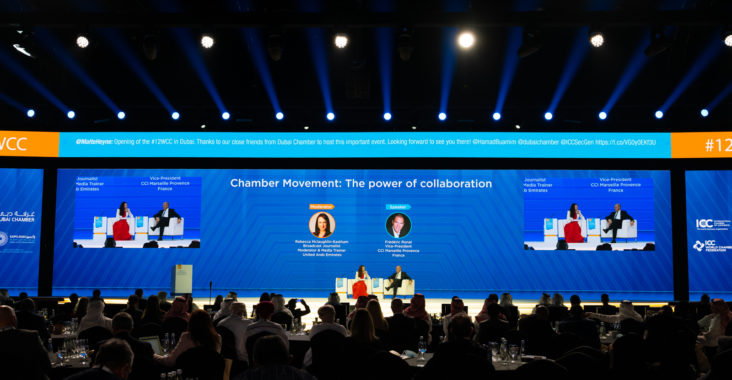Dubai Chamber Releases New Whitepaper Highlighting Changing Needs Of Businesses In Post-Covid Era

Chambers of commerce need to realign the services they provide their members to remain effective advocates of businesses in the post-pandemic era, according to a new whitepaper released by Dubai Chamber at the 12th World Chambers Congress (12WCC), which kicked off today in Dubai.
Titled: Generation Next: Chambers 4.0 – Transforming Disruption into Opportunity for Global Business,the report identified key trade and technology trends, challenges and opportunities emerging in the current business landscape, as well as recommendations for chambers of commerce that are keen to adopt Chambers 4.0 and innovate in order to remain relevant in the face of new realities.
Among the key takeaways and recommendations are that chambers must work to cultivate an entrepreneurial ecosystem to support small and medium size companies that will continue to play a vital role in the global economy; that environmental, social and governance principles will be key drivers of business in the future; and that businesses must orientate themselves towards the challenge of achieving net-zero carbon emissions.
The report noted that governments need to enact reforms that incorporate digital requirements in trade agreements, with digitally-enabled tradeshown to provide significant economic benefits, efficiency gains and environmental rewards. Digitalisation – alongside automation and data intelligence chains – was also highlighted as being essential to modernise and boost the efficiency of supply chains, the vulnerabilities of which were exposed during the pandemic.
Commenting on the report, H.E Hamad Buamim, President and CEO of Dubai Chamber and Chair of ICC-World Chambers Federation, said that businesses are now up against some of the greatest challenges they have ever faced, with chambers of commerce needing to reconfigure their services to help companies meet these new demands.
“In 2021, the world is at a crossroads. Governments and businesses must adapt to the new normal and learnto navigate a world in which workplace habits have been completely upended. The climate crisis has become more pressing than ever and threats to international trade and global cooperation still persist.Collaboration and open, constructive dialogue are needed to ensure the success and prosperity of future generations,” said H.E. Buamim.
“This report explores how the next generation of chambers of commerce can help businesses harness new technologies to continue the digital transformations that were accelerated during the Covid-19 pandemic. It examines how small and medium-sized enterprises have had to adapt since the onset of the pandemic and how Generation Next: Chambers 4.0 can continue supporting this core pillar of the global economy,” he said.
H.E. Buamim added that the Dubai Chamber whitepaper is an important reference tool that can guide chambers as they outline their own strategies for transitioning to Chambers 4.0 and embracing innovation, adding that the report provides a foundation for building a framework for chambers’ activities moving forward, one which are being explored at the12WCC in Dubai.
Incorporating research into its analysis for the way forward for chambers of commerce, the environmental and social governance (ESG) section in ‘Generation Next: Chambers 4.0’ whitepaper highlighted a 2021 Oxford Business Group survey of CEOs that found that40.6%of its respondents saying that the pandemic had a significant impact on appetite for ESG options in their markets.
Under its analysis of supply chains, the paper cited a survey of global supply chain executives published by EY in February 2021, with 64% of its respondents saying that digital transformation would accelerate due to the pandemic and more than half saying that autonomous supply chains using driverless forklifts and robots in warehouses were either already in place, or would be, by the middle of the 2020s.
With respect to SMEs playing an increasingly important role in the post-pandemic era, the whitepaper drew attention to France, where 84,000new businesses were registered in October 2020 alone – a 20% increase on the previous year and the highest figure on record, while its assessment on digitalising the trading ecosystem reported that digitalisation could increase trade across the G7 countries to nearly USD9trillion by 2026 – a rise of 46%on 2019 figures.
Finally, looking at future-proofing the workforce, the paper cited a 2019 study commissioned by the UK’s Industrial Strategy Council that reported that by 2030, seven million workers in the UK could be unskilled for their job requirements – roughly 20% of the labour market. It found that basic digital skills will be the most lacking, with potentially five million workers become acutely underskilled in basic digital knowledge within the next decade.
The 12thWorld Chambers Congress in Dubai runs until Thursday, November 25, at Madinat Jumeirah in Dubai, with the three-day event exploring the role of chambers of commerce in a world that has been irrevocably changed by the global pandemic. Co-hosted by the ICC- WCF and Dubai Chamber, the congress is the first edition held since the coronavirus outbreak, with its programme designed to help business chambers chart a course fit for a new era of business.


